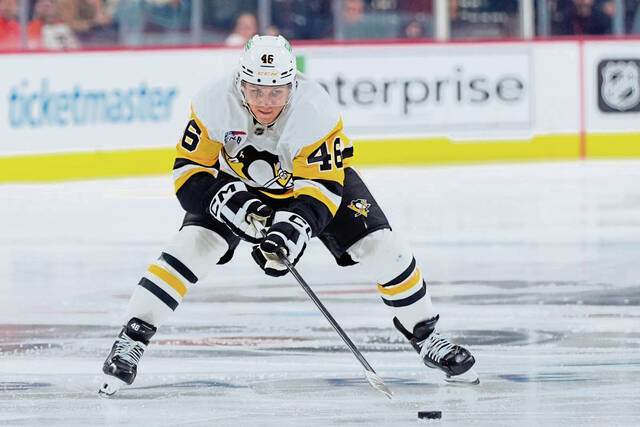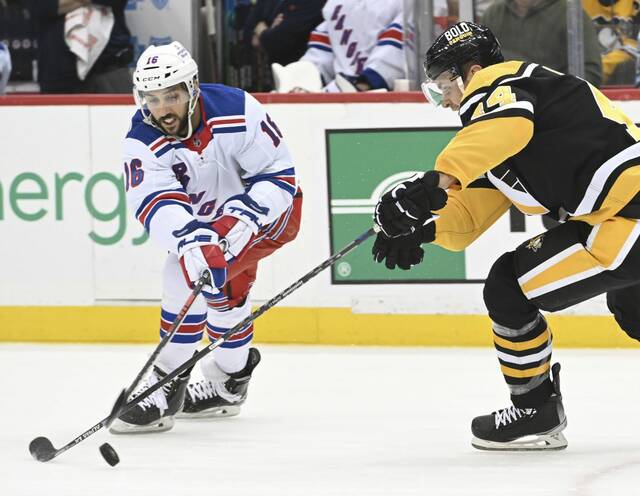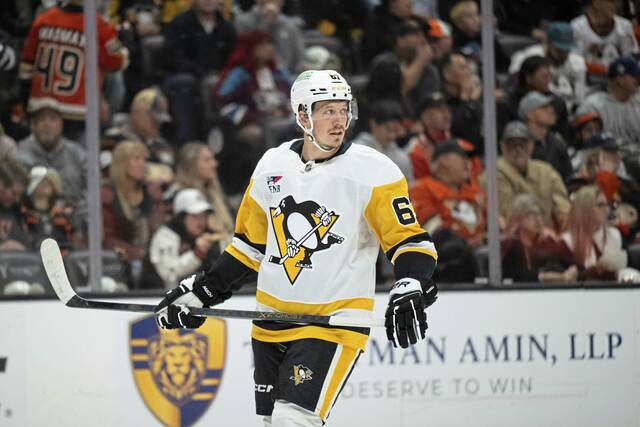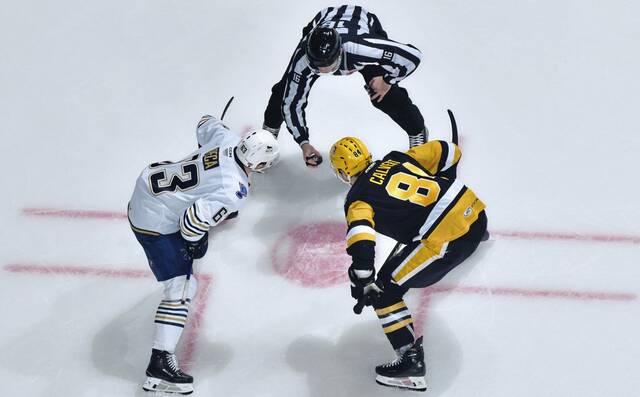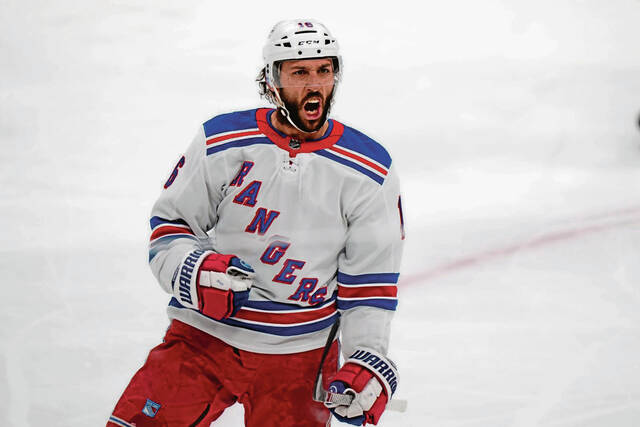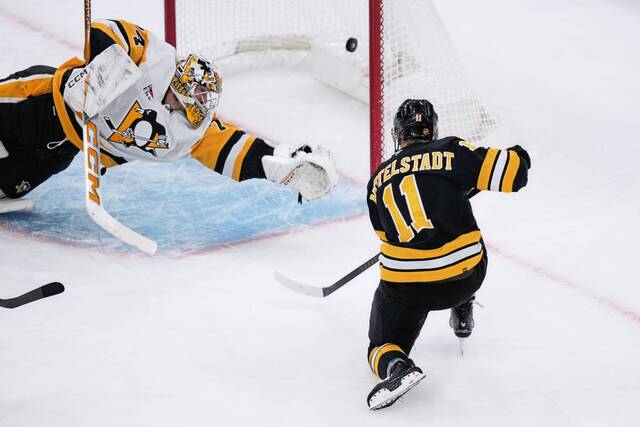While the NHL is on hold because of the ongoing coronavirus pandemic, the Tribune-Review will offer the Double Team project, an examination of the five best players who have contributed substantially to the Penguins and another franchise. For consideration, a player must have played at least the equivalent of a full season for each franchise. (Sorry, Jarome Iginla fans.)
Today, a look at the Philadelphia Flyers. As the Penguins’ longest and most enduring rivals, the Flyers, named primarily for phonetic appeal, joined the NHL along with their cross-state foes during the NHL’s 1967 expansion. In 292 all-time games against the Flyers, the Penguins have a 105-148-39 record.
1. Rick Tocchet, right winger
There are few things hockey fans from either end of the Keystone State will agree on. Rick Tocchet being one of the baddest men on Earth is one of them.
A sixth-round pick in 1983, Tocchet debuted in 1984-85, appearing in 74 games and putting up 39 points as well as a team-leading 181 penalty minutes while helping the Flyers reach the Stanley Cup Final, losing to the Edmonton Oilers.
Over the next three seasons, Tocchet led the team in penalty minutes, a considerable achievement given the franchise’s general approach to rough play. And during that span, he began to develop into one of the NHL’s premier power forwards.
By 1986-87, Tocchet played in 69 games and scored 21 goals, marking the first of the 10 seasons he would reach the 20-goal barrier. He also added 21 points in 26 playoffs games while helping the Flyers reach another Stanley Cup Final, losing to the Oilers again.
Tocchet led the Flyers in scoring twice, with 96 points in 1989-90 and 71 points in 1990-91. Midway through the 1991-92 campaign, he was dealt across the commonwealth in a blockbuster trade.
Finding a home on the Penguins’ top line, Tocchet formed an imposing trio along with franchise center Mario Lemieux and left winger Kevin Stevens. In only 19 games following the trade, Tocchet put up 30 points.
Famously playing throughout the playoffs with a broken jaw, Tocchet appeared in 14 games, recorded 19 points and helped the Penguins win the Stanley Cup that spring.
Fully healthy and acclimated to his new team, Tocchet enjoyed the signature season of his career in 1992-93 with the Presidents’ Trophy-winning Penguins. Appearing in 80 games, Tocchet set career-highs with 48 goals and 108 points.
Laboring through injuries that limited him to 51 games in 1993-94, Tocchet was dealt to the Los Angeles Kings during the 1994 offseason. After bouncing around with the Kings, Boston Bruins, Washington Capitals and Phoenix Coyotes, Tocchet returned to Philadelphia at the 2000 trade deadline and helped the club reach the Eastern Conference final.
More of a bottom-six forward by this stage of his career, Tocchet lasted three more seasons in Philadelphia before retiring. With 1,817 penalty minutes, he remains the Flyers’ career leader in that category.
2. Mark Recchi, right winger
Of course, the Penguins could not acquire Tocchet without giving up something of quality in return, and Recchi went to eastern Pennsylvania in the transaction.
As was the case in Pittsburgh, Recchi was a marvelous producer in Philadelphia. Initially teamed with franchise center Eric Lindros, Recchi established a still-standing franchise record for points with 123 in 1992-93 while being selected for the All-Star Game.
After following that with a 107-point effort and another All-Star nod in 1993-94, Recchi was on the move again, traded to the Montreal Canadiens early in the lockout-shortened 1994-95 campaign.
By March of 1999, Recchi returned to the Flyers in another trade. In 1999-2000, he led the Flyers in scoring again with 91 points, earning another selection to the All-Star Game. In 2000-01, he was the Flyers’ leading scorer a fourth time with 71 points.
Recchi enjoyed three more productive seasons in Philadelphia, reaching the 20-goal mark in each and aided the team’s run to the Eastern Conference Final in 2004.
A fourth-round pick in 1988, Recchi was a member of the Penguins for seven seasons over three different stints. After debuting in 1988-89, Recchi’s first full season in the NHL was 1989-90 as he posted 30 goals and 67 points in 74 games and a fifth-place finish in voting for the Calder Memorial Trophy, which recognizes the league’s top rookie.
While Lemieux recuperated from back surgery in the early stages of 1990-91, Recchi picked up the slack, earning his first All-Star Game selection and leading the team in scoring with 113 points in 70 games. That spring, he had 34 points in 24 postseason games for the Stanley Cup champions.
Rejoining the Penguins as a free agent just prior to the 2004-05 lockout, Recchi had brief-but-productive second and third acts with the Penguins. In 2005-06, he had 57 points in 63 games before being moved at the trade deadline to the Carolina Hurricanes. Recchi re-signed with the Penguins during the 2006 offseason. At age 38, he appeared in all 82 games and recorded 67 points.
Early the following season, Recchi was claimed off waivers by the Atlanta Thrashers.
3. Kjell Samuelsson, defenseman
A giant for any era, Samuelsson towered over most of his peers at 6-foot-6, 235 pounds. For the majority of his career, he was the league’s tallest player.
But Samuelsson wasn’t a lumbering clod who relied only on brute force. He made up for a lack of speed with a long reach as well as an intelligent game. And while he wasn’t an overly physical player, few tried to test him.
The Flyers acquired Samuelsson from the New York Rangers via trade in December 1986. Thriving under coach Mike Keenan, Samuelsson appeared in 46 games after the transaction and put up seven points as well as 86 penalty minutes. He appeared in all 26 postseason games of the team’s run to the Stanley Cup Final.
Samuelsson remained a sturdy, dependable presence on Philadelphia’s blue line for the next five seasons but rarely drew attention — negative or positive — given the nature of his game. His steady play even earned him a selection for the 1988 All-Star Game.
Wanting to add a defensive presence to his blue line, Penguins general manager Craig Patrick acquired Samuelsson as part of the deal that also netted Tocchet.
Occasionally teamed with fellow Swedish defenseman Ulf Samuelsson (no relation), Kjell Samuelsson stabilized the team’s blue line, helping the club win the Stanley Cup that spring.
Samuelsson spent three more seasons with the Penguins, and by the 1995 offseason, he re-signed with the Flyers.
Appearing in 75 games and recording 14 points in 1995-96, Samuelsson helped the Flyers reach another Stanley Cup Final, losing to the Detroit Red Wings.
Injuries hobbled Samuelsson for the next two seasons, and by October 1998, he joined the Tampa Bay Lightning as a free agent.
4. Ross Lonsberry, left winger
Lonsberry wasn’t the most celebrated member of the Broad Street Bullies, but he was one of the most valuable components in them becoming the first expansion franchise to win the Stanley Cup in 1974.
Flyers general manager Keith Allen acquired Lonsberry in a seven-player trade with the Kings in January 1972, then the largest such transaction in NHL history.
Primarily used on the Flyers’ second line with Rick MacLeish and Gary Dornhoefer, Lonsberry, who won the Bill Masterton Memorial Trophy in 1973 for dedication to the sport, set a career high with 32 goals along with 51 points in 1973-74. He then added 13 points in 17 postseason games as the Flyers won their first championship.
Appearing in all 80 games in 1974-75, Lonsberry, a two-way forward, had 24 goals and 49 points then added seven points in 17 games as the Flyers defended the Stanley Cup.
The Flyers and Lonsberry played for the Stanley Cup again in 1976, losing to the Canadiens. After two more productive seasons in Philadelphia, he was traded to Pittsburgh.
Lonsberry was solid but hardly spectacular in his three-year run with the Penguins to finish his career. In 1978-79, he recorded 24 goals and 46 points. During 236 career games with the Penguins, Lonsberry recorded 129 points and helped the team reach the playoffs all three seasons he played in Pittsburgh.
5. Jaromir Jagr, right winger
There are plenty of players who spent time with both franchises who had more meaningful existences with the Flyers than Jagr. But as someone bound for the Hockey Hall of Fame, he gets the nod here.
The Penguins tried to re-sign Jagr in the 2011 offseason, a decade after he was traded to the Washington Capitals in a transaction that was a salary dump. The #JagrWatch that summer took a strange turn, however. Spurning the Penguins’ very public courtship, Jagr signed with the rival Flyers.
After spending three seasons playing in Russia, a 39-year-old Jagr showed he could still play in the NHL, putting up 54 points in 73 games. Most memorably, he played a key role in the Flyers defeating the Penguins in the Eastern Conference quarterfinal round that spring.
His stay in Philadelphia was brief as he joined the Dallas Stars as a free agent in July 2012.
Jagr’s accolades with the Penguins are well documented, especially within this series. The No. 5 overall pick in the 1990 draft, Jagr played a key role in the franchise’s first two Stanley Cup titles in 1991 and ‘92.
A six-time All-Star with the Penguins, Jagr won the Art Ross Trophy as the league’s top scorer five times in Pittsburgh. He also earned the Hart Memorial Trophy as the league’s MVP in 1999.
Still the franchise’s career leader in winning goals (78), Jagr is the NHL’s second-leading career scorer with 1,921 points.
Honorable mention: Mike Bullard, center; Ruslan Fedotenko, left winger; Orest Kindrachuk, center; Maxime Talbot, center; Ken Wregget, goaltender.



